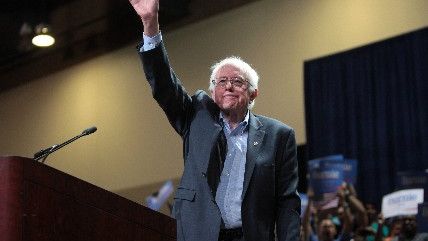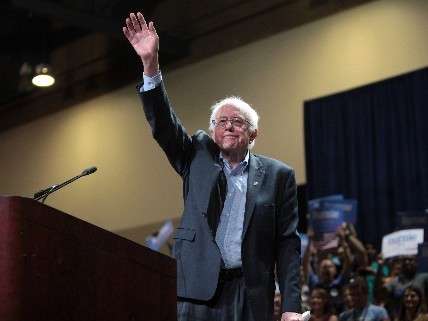Bernie Sanders Wants Democratic Socialism to Remain Relevant, So He Won't Quit
There won't be a "Bernie Sanders 2020" campaign and he has no political heirs, so he's staying in until the convention.


Sen. Bernie Sanders (D-Vt.) doesn't care what the Associated Press and NBC News have to say about Hillary Clinton securing enough pledged delegates to clinch the Democratic nomination for president, he says he's not dropping out until the Democratic National Convention in July.
Last night, NBC News reported that Clinton's "new tally includes pledges from over a dozen new superdelegates as well as her accumulation of 36 pledged delegates in Sunday's Puerto Rico primary." Sanders' spokesman called this a "rush to judgment" and said in a statement, "Secretary Clinton does not have and will not have the requisite number of pledged delegates to secure the nomination. She will be dependent on superdelegates who do not vote until July 25 and who can change their minds between now and then."
This is factually true, and the fact that the AP and NBC News chose to call the entire primary race for Clinton the night before six states (including California, with its 475 delegates at stake) plays into the Sanders camp's narrative that "the game is rigged." But what Sanders and his supporters refuse to accept is that Sanders has always had a superdelegate problem, which would only be surmounted by Sanders winning convincingly among pledged delegates, which he has failed to do. Clinton holds a lead of about 300 pledged delegates (at last count) and has amassed over three million more votes.
It's simply not a close enough race for the Democratic Party bigwigs who become superdelegates to abandon their pledged loyalty to the former First Lady, senator from New York, and secretary of state, who has spent more than two-and-a-half decades cultivating such support. Sanders, on the other hand, has always been a defiant outsider, and though he's caucused with Democrats in Congress, he always refused to join them until he decided to run for president last year.
Unlike the Republican's runner-up, 45-year-old Sen. Ted Cruz (R-Tx.), who exited the race last month and immediately began planting the seeds for a 2020 run for the White House, Sanders is 74 and there is virtually no chance he will run for president in four years. And while Cruz might be an outsider despised by his Republican colleagues, he is at least somewhat apart of a political movement (the Tea Party) which includes fellow members of Congress. To date, there are no other self-described "democratic socialists" in Congress whom Sanders can claim as the heirs to his movement. If Sanders' intent is to make the Democrats more "socialist," he has nothing to gain by dropping out before every vote — including the superdelegates' — is cast.
Clinton supporters have been calling for Sanders to either drop out or "tone down" his criticism of the frontrunner since as early as April. Yet last month, an NBC News/SurveyMonkey poll indicated a majority of likely Democratic voters thought Sanders should remain in the race until the convention. Also, staying in the race has given Sanders the leverage to put five of his picks on the fifteen-member panel writing the Democratic Party platform. And though it remains unlikely, it is not insignificant that the FBI is investigating the "presumptive" nominee, an extraordinarily rare liability for a candidate who is already widely distrusted and disliked by the voting public heading into the general election. If there's a "July surprise," a still-competing candidate Sanders would be the beneficiary of it.
As recently as this weekend, Sanders insisted he would continue his campaign until the convention even if Clinton sweeps today's primaries. He also opened up a new line of attack on Clinton in an interview with CNN's Jake Tapper. As reported by the New York Times:
"If you ask me about the Clinton Foundation, do I have a problem when a sitting secretary of state and a foundation run by her husband collects many millions of dollars from foreign governments, governments which are dictatorships?" Mr. Sanders said.
"You don't have a lot of civil liberties or democratic rights in Saudi Arabia," he told the interviewer, Jake Tapper. "You don't have a lot of respect there for opposition points of view for gay rights, for women's rights. Yes, do I have a problem with that? Yes, I do."
These are fair criticisms, though it takes some nerve coming from a guy who has championed a number of dictatorships who share his socialist principles. Sanders even fawned over the "religious affection" he claims to have seen in the eyes of the impoverished and imprisoned Cuban people for their dictator, Fidel Castro, who put gays in labor camps.
Still, if he's going to go after Clinton over the questionable relationships of her family's charity organization, it remains puzzling why Sanders continues to avoid hitting the former secretary of state on her "damn emails."
Perhaps he feels that's doing Donald Trump's dirty work for him, and he'd prefer to be a constant irritating reminder to Clinton and the mainstream Democrats that they need his energized supporters to win in November, and perhaps for years to come. Conversely, Sanders doesn't need "the center" at all because his political career will have peaked by the convention in July, at the latest.


Show Comments (54)